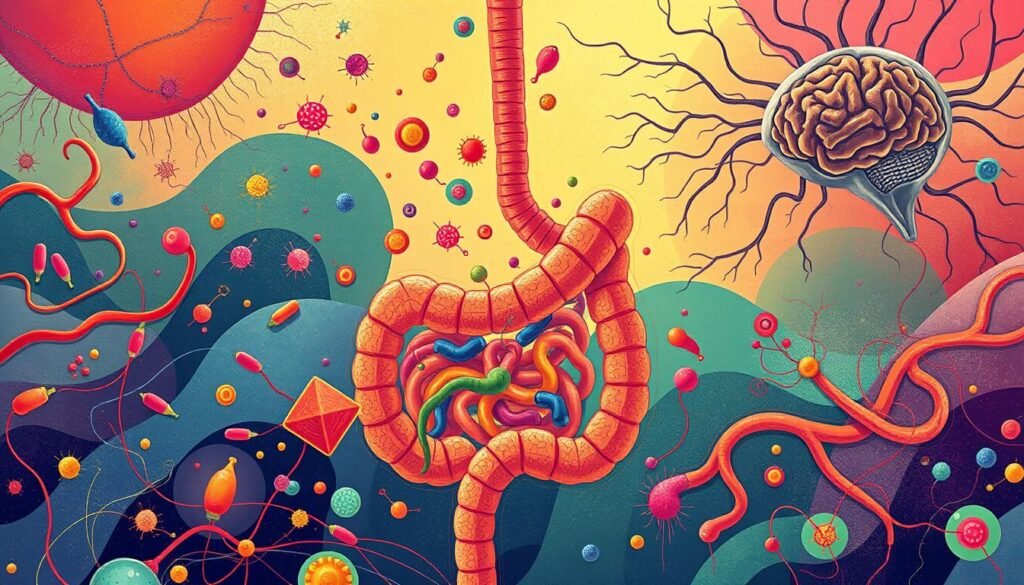Did you know that about 60% of people with anxiety have stomach issues? These include suddenly needing to poop when stressed. This shows us how closely our mind and gut are connected. A lot of folks are curious about why anxiety affects our bowel movements. It’s because stress and emotions trigger a natural body reaction, impacting our digestion.
It’s not just a coincidence that stress and bowel issues are linked; it’s a common situation. Scientists have looked into how stress affects our digestion. It can lead to urgency or other stomach troubles. We’ll look into why this happens and how to handle it. To understand more about this gut-brain link, check out this article here.
Key Takeaways
- Anxiety can have a significant impact on digestive health and bowel movements.
- Stress alters gut motility, affecting how food moves through the digestive tract.
- Managing anxiety through techniques like mindful eating and regular exercise can improve digestive health.
- Many individuals with anxiety experience increased gastrointestinal symptoms, including diarrhea and constipation.
- Understanding the gut-brain connection is essential for managing anxiety-related digestive issues.
Understanding the Gut-Brain Connection
The gut-brain connection shows how our stomach and brain work together, impacting our health. It points out that feelings, like stress, can affect our stomachs. As many as 40% of people might face gut problems and feel anxious or sad because of it.
The enteric nervous system is key here, with over 500 million nerve cells. The vagus nerve links our gut and brain, affecting our feelings and stomach activities. Studies suggest that our gut signals can change our metabolism, showing another way anxiety impacts our health.
The gut microbiome is crucial in making brain chemicals for communication between the gut and brain. Research shows a link between gut health issues and mental disorders like anxiety. Stressful times can cause stomach upset, including diarrhea and pain.
Scientists are looking into new treatments, such as probiotics and some depression meds. They might help by targeting the nerves in the gut. This research highlights how our mental state can cause physical reactions in our digestive system.
Why Does Anxiety Make You Poop?
Anxiety affects our digestion, leading to issues like frequent pooping. It makes us feel stressed, which increases bowel movements. Our gut reacts to both emotional and physical stress, explaining the link.
Role of the Gut in Stress Responses
Our gut is like a second brain and feels stress deeply. Cortisol, a stress hormone, causes cramps that may lead to diarrhea. Almost 60% of people with anxiety or depression face ongoing gut problems, such as IBS.
Focusing on gut health is crucial. Learn more about why anxiety makes you poop.
Impact of the Nervous System on Digestion
The nervous system and gut work closely, affecting how we digest during stress. This link can make our gut issues worse when we’re anxious. Stress might cause symptoms like diarrhea or constipation.
Stress changes our gut bacteria, leading to problems like bloating or nausea. Practices such as deep breathing, exercise, and diet changes can help manage anxiety and its effects on digestion.
The Fight or Flight Response and Digestion
When we feel stressed, our fight or flight response affects our digestion. This response triggers hormones and neurotransmitters. They mix up our normal gut functions, often causing diarrhea from anxiety.
How Stress Hormones Affect the Digestive System
Stressful moments release adrenaline and cortisol. These hormones wake up the sympathetic nervous system. It messes with our digestion. Digestion slows down, making us feel bad. We might get heartburn, cramps, and feel nauseous.
Cortisol can also make stomach cramps worse. This can deepen stress-related issues, including anxiety diarrhea.
The Urge to Poop During Stressful Situations
Stress can make us need to poop right away. This reaction comes from our ancestors’ need to react quickly to survive. In tense situations, our gut works overtime. This can make us run for the bathroom.
Long-term stress makes this worse. But taking it easy and knowing what stresses us out can help. It keeps our digestion running smoothly.
Common Digestive Symptoms Associated with Anxiety
Anxiety can lead to many uncomfortable symptoms in your digestive system. It can make everyday life complicated, especially for those with conditions like irritable bowel syndrome. By knowing the common issues, you can manage them better.
Diarrhea and Constipation from Anxiety
Chronic diarrhea and constipation are common in people with anxiety. This happens because stress affects how your stomach works. Here are some symptoms linked to anxiety:
- Chronic diarrhea: Anxiety speeds up bowel movements, making you go to the bathroom a lot.
- Constipation: Anxiety can make it hard to pass stools by tightening stomach muscles.
- Gas and bloating: Slow digestion from anxiety leads to gas and a swollen belly.
- Urgency to go: Feeling a constant need to go to the bathroom is common with anxiety.
Other Gastrointestinal Issues
Anxiety can cause other stomach problems too. For instance, some people feel:
- Nausea: Anxiety often makes people feel like they’re going to throw up.
- Abdominal cramps: Stress can make cramps worse, and they can hurt a lot.
- Changes in appetite: Some people eat more or less when they’re anxious.
- Irritable bowel syndrome (IBS): Many with anxiety also have IBS, affecting their life a lot.
It’s important to know how anxiety can affect your digestive health. Recognizing these symptoms lets you get the right help. This knowledge empowers you to take control of your health.

The Science Behind Anxiety and Digestive Disorders
Anxiety affects our gut health a lot. Studies show a link between anxiety and irritable bowel syndrome (IBS). As anxiety levels go up, digestive problems do too. This shows how connected our gut and brain are.
Studies Linking Anxiety with Irritable Bowel Syndrome (IBS)
People with anxiety often suffer from IBS. A big finding is that up to 44% of IBS patients faced abuse in the past. This shows a strong link between trauma and gut health. Anxiety leads to more cases of chronic diarrhea and constipation. This stresses the link between our mind and gut, and how anxiety affects them.
The Role of Serotonin in the Gut
Serotonin is key for a happy gut. It’s mostly made in our gut and controls digestion. Anxiety can mess up serotonin levels. This can cause symptoms like bloating, pain, and problems with bowel movements. Treating anxiety can help with these gut issues. It shows why looking after our mental health is crucial for good digestion. For more info on how anxiety impacts digestion, click here.
| Study Year | Key Findings | Population |
|---|---|---|
| 2021 | Higher prevalence of chronic diarrhea and constipation in anxious individuals | Korean high school students |
| 2020 | Anxiety and stress alters gut motility | General population |
| 2019 | Mindful eating improves digestive function and stress management | Various studies reviewed |
Impacts of Chronic Anxiety on Digestive Health
Chronic anxiety can harm your digestive health. It can cause many stomach issues that disrupt daily life. It’s important to know how long-term anxiety affects your bowel movements. This knowledge helps in handling symptoms better.
For people with irritable bowel syndrome (IBS), more anxiety can make their symptoms worse. They may notice changes in how often and how smoothly their bowels move.
Long-term Effects on Bowel Movements
Living in stress can make your digestion suffer. Anxiety can cause:
- Increased stomach cramps and pain.
- Loose or watery stools due to reduced water absorption in the colon.
- Bloating and gas from imbalances in intestinal bacteria.
- Changes in appetite, which can contribute to constipation or diarrheal episodes.
Dealing with chronic anxiety can be hard because of these issues. It’s very important to manage anxiety and poop well.
The Gut Microbiome and Mental Health
Your gut microbiome greatly affects your mental health. It plays a role in how you feel and your anxiety levels. An imbalance in your gut bacteria can make anxiety worse. This can start a cycle that makes digestive problems even more severe. Keeping a healthy gut is key for feeling mentally well.
Here are some ways to do that:
- Eat a lot of fiber to help your digestion and promote regular bowel movements.
- Try mindfulness to stay calm and lower anxiety.
- Exercise regularly to release endorphins, which makes you feel better and lowers stress.
Improving your gut health can naturally boost your mental wellness. This helps in controlling chronic anxiety and its effects on digestion. Avoid foods that trigger your symptoms and drink plenty of water to help your digestive system, especially if you have chronic conditions.

How to Manage Anxiety-Related Digestive Issues
Managing anxiety and poop-related issues can make life better. Adding certain foods to your diet and eating mindfully can ease discomfort. Here are tips to help manage your digestive health more effectively.
Dietary Recommendations for a Healthy Gut
Improving gut health can lessen anxiety and help with bowel movements. Important diet tips include:
- Low FODMAP Diet: Eating fewer fermentable carbs may help with irritable bowel syndrome (IBS).
- Increased Fiber Intake: Foods high in fiber, like whole grains, fruits, and veggies, are great for regular bowel movements.
- Probiotics: Yogurt and fermented foods have probiotics that boost gut health and ease anxiety-related digestive problems.
- Avoiding Trigger Foods: Stay away from spicy, fatty foods, and caffeine to avoid stomach upset.
- Staying Hydrated: Drinking plenty of water helps digestion, prevents constipation, and improves gut function.
Mindful Eating Practices
Being aware during eating is key to handling digestive issues from anxiety. Mindful eating helps digestion and reduces stress. Try these methods:
- Slow Down: Eating slowly helps your body know when it’s full, lowering the chance of overeating and discomfort.
- Avoid Distractions: Concentrate on eating instead of doing other things. This can improve how you notice hunger and what you like to eat.
- Keep a Food Diary: Writing down what you eat and how it affects you helps find what causes your anxiety.
- Mindful Breathing: Deep breathing before eating calms your nerves and aids in better digestion.
| Practice | Benefit |
|---|---|
| Low FODMAP Diet | May alleviate IBS symptoms and improve digestion. |
| Increased Fiber Intake | Supports regular bowel movements and gut health. |
| Probiotics | Enhances gut flora and may reduce anxiety-related symptoms. |
| Mindful Eating | Promotes awareness of food choices and physical cues. |
| Staying Hydrated | Prevents constipation and supports digestive function. |
By combining gut-healthy foods with mindful eating, you can manage anxiety and poop issues well. Focusing on a balanced diet and mindful meal times leads to better health.
Techniques to Reduce Stress and Improve Gut Health
Reducing stress is key to better gut health and easing stress-related digestive problems. Through certain techniques, people can lessen digestive issues linked to anxiety. These methods improve mood and help the digestive system stay healthy.
Deep Breathing and Relaxation Techniques
Deep breathing and relaxation exercises are great for fighting stress. They turn on the body’s relaxation response, easing tension. Since the gut’s health is tied to stress levels, deep breathing helps. It alleviates symptoms like bloating and discomfort tied to anxiety.
By breathing slowly and deeply, you connect more with your body. This helps you handle stress and digestive problems better.
The Importance of Regular Exercise
Exercise is amazing for reducing stress and boosting gut health. It gets endorphins going, which lifts your mood and lowers anxiety. Working out also helps with regular bowel movements and lessens GI symptoms. It supports a healthy gut environment.
Activities like walking, yoga, and swimming also aid in relaxation and enhance digestion by improving blood flow and encouraging gut movement.

| Technique | Benefits for Gut Health | Effects on Stress Levels |
|---|---|---|
| Deep Breathing | Eases bloating and discomfort | Reduces physiological tension |
| Yoga | Promotes healthy digestion | Increases relaxation and clarity |
| Walking | Stimulates digestion and circulation | Improves mood through endorphin release |
| Swimming | Enhances overall digestive functioning | Reduces anxiety and stress fatigue |
Adding these strategies to your daily life can boost your well-being by supporting gut health. Effectively managing stress shields you from digestive disorders. It shows the value of taking care of your overall health.
When to Seek Help for Anxiety and Digestive Problems
Knowing when to get help for anxiety and stomach issues is very important. Many people have anxiety diarrhea, causing a lot of discomfort. There are signs that show you might need help from professionals. Recognizing these symptoms helps people know when it’s time to get help.
Identifying Serious Symptoms to Watch For
There are certain symptoms you should not ignore:
- Prolonged symptoms: If anxiety-related stomach problems don’t go away after a few weeks, see a doctor.
- Sudden changes in bowel habits: Unexplained changes in bathroom habits need to be checked out.
- Severe abdominal pain: Bad pain with anxiety diarrhea might mean something more serious.
- Presence of blood in the stool: Blood in your stool could point to major health issues, like ulcerative colitis or Crohn’s disease.
- Weight loss: Losing weight without trying, along with stomach problems, is a red flag.
The Role of Professional Support in Management
Getting help from professionals is key to handling anxiety and stomach disorders. Doctors can give full checks and suggest treatments that fit the person’s needs. Possible treatments include:
- Psychological therapy: Methods like cognitive-behavioral therapy work well for anxiety.
- Medication: Medicines for depression or anxiety can ease symptoms tied to anxiety diarrhea.
- Dietary guidance: Doctors can advise on what to eat to help your stomach and lessen discomfort.
- Regular screenings: Those over 50 or at risk for things like colon cancer should get regular checks.
In short, if you’re dealing with ongoing worry or stomach issues, it’s crucial to recognize when to seek help. Taking steps early can lead to better health and happiness.
Tips for Maintaining Digestive Health During Stress
It’s important to take care of your digestive health when you’re stressed. Stress affects your gut directly. So, drink plenty of water and make some lifestyle changes to improve your wellbeing. Being aware of your digestion can help handle stress better.
Hydration and Its Effects on the Digestive System
Keeping hydrated is key for a healthy digestive system. When you drink enough water, your gut works better. Also, it helps to decrease problems like heartburn and swelling. Since 85% of people have tummy troubles when stressed, drinking water is very important.
Routine and Lifestyle Adjustments
Having a regular routine is good for your gut. Eating meals and snacks consistently can ease certain gut issues. Exercise and stress reduction can positively influence most people. Relaxation practices like yoga help manage stress in 80% of those who try it. Keeping track of what you eat may pinpoint what upsets your stomach.
Conclusion
Anxiety and digestion are closely linked. This is because of the tight connection between our gut and brain. Anxiety can lead to issues like IBS and stomach problems.
Understanding this relationship helps us find ways to manage stress better. This is key for better digestive health.
Many people with anxiety experience digestive disorders. This is especially true for those highly educated or living in cities. Making lifestyle changes and practicing mindfulness can help a lot.
Changing what we eat, relaxing, and exercising regularly can improve gut health. This can make us feel better overall.
If anxiety affects your digestion, getting help is a good idea. Healthy habits and managing stress can reduce symptoms. This helps bring balance back to your digestive system and makes life more enjoyable.